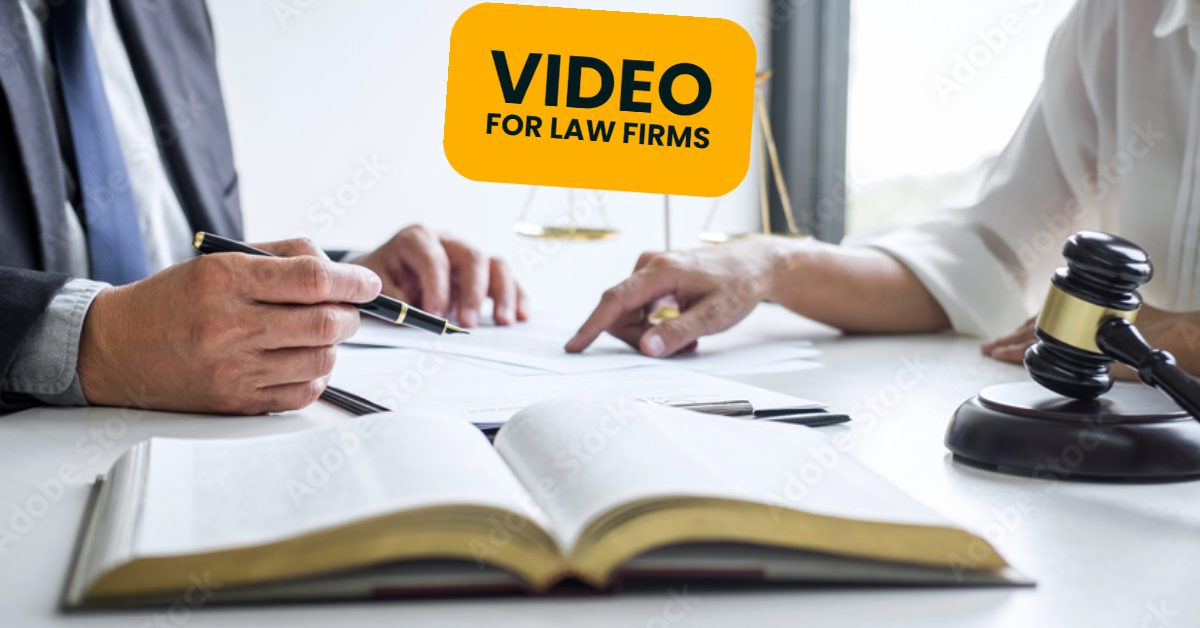While you can certainly promote your law firm with text-based reviews, research suggests video testimonials are more effective in your marketing efforts. They fit nicely with any firm’s business plan, content marketing plan, or law firm marketing strategy.
Video testimonials are especially persuasive.
While statistics are often for consumer behavior, they do provide insight. For example, 79% of consumers can be persuaded to buy or hire a service if it is endorsed by someone they would trust.
Testimonials play that role.
What is a testimonial?
A testimonial is an account of a person’s experience with your law firm. They are reviews of your services and are posted online so potential legal clients will have a good sense of the quality of your offerings.
Their primary purpose is to add to your trust factor – the natural appearance of your trustworthiness. And developing that “trustworthiness” should be a significant part of your marketing plan.

The Best Testimonials
The best testimonials will feel both honest and accurate to prospective clients. To add to the authenticity of the testimonial, they should include concrete examples of how you helped your clients achieve their goals. They should also be aimed at the people you would feel to be ideal clients.
Think of the impact this has on any new prospective client, if they can see a former client in a testimonial facing a similar legal issue to theirs and talking positively about their outcome.
What impact do you think this would make?
Video testimonials are More Engaging Than Text
Text-based testimonials are boring and unengaging, which is why only 16% of consumers say they trust them. In fact, video testimonials are so much more engaging than their written counterparts that 86% of consumers say they’re more likely to buy a product or service after watching a video testimonial.
Shorter Videos are More Effective at Conversions
As a rule, your video testimonials should be roughly 90 seconds in length. This gives you enough time to highlight the most important features and benefits of your practice area without overstaying your welcome. It’s important to highlight the client’s level of satisfaction with your legal work.
Remember to keep these videos short. While longer videos do have higher engagement rates, they don’t actually convert more viewers to clients. Shorter videos, however, do. This is especially true if you’re advertising on social media platforms.
Facebook’s algorithm only shows videos that are 90 seconds or shorter. In fact, one study found that Facebook ads with shorter videos have higher click-through rates.
Another benefit of shorter videos is that they are easy to produce. This means that you can afford to get more high-quality testimonials in a shorter length of time.
Video Produces Real ROI
There’s a good chance that you’ve heard of the term “video marketing.” But have you ever wondered whether it actually works?
Video marketing is a bona fide marketing strategy. In fact, it’s the single best marketing tool you have. This is because it has the potential to produce the highest return on investment (ROI) of all marketing tools. On average, B2B companies see a whopping 200% return on their investment in video marketing.
This is thanks to the fact that video is a highly effective way to build trust, create leads, and increase sales. There’s plenty of research that supports the effectiveness of video marketing. For example, 72% of executives say that they’re more likely to buy from a company after watching one of its videos. Video is also the most effective way to get your message out to a wide audience and build a good reputation.

DIY Approach to Testimonial Videos
Video marketing and testimonials are effective ways to build trust with potential customers. But the problem many law firms run into is that they don’t have the budget to produce professional marketing or testimonial videos.
These videos don’t have to cost a fortune to produce. All you have to do is ask a few of your most satisfied clients to record a short testimonial for you. Once you have these videos, you can start promoting them in blog posts, or on the law firm’s website. Be sure to include a call to action at the end of your videos so that viewers can learn more about your law firm.
What to ask your clients.
Approaching a client to do a testimonial is not necessarily the easiest thing. They may have the impression all you want are sugarcoated responses. But if you put their testimonials in a context where you really want to learn from their experiences, you may get great responses and have solid testimonials with authenticity.
But it’s important to be clear about what you are asking from your clients. You don’t want them confused or to respond in the wrong way. What you are looking for are positive reviews. But you don’t want to give them the opportunity to say something that’s not helpful. If you are asking for great testimonials, you may want to try and include the questions you want to be answered. For example: What do you like most about working with us? What’s your favorite aspect of our service?
For business owners, you may want to ask about what they were expecting to achieve. What would they tell others about your law firm? What you ask, and how you ask it, can make or break your ability to receive the feedback you want.
Create a safe space for your customers to respond
Nevertheless, you will want to create a system where you can vet potential testimonials and choose the best of the best.
A lot of businesses try to create a safe space for their clients to respond, but they end up scaring their clients away. You want your customers to feel comfortable enough to tell you the truth, but you don’t want them to feel like they have to respond to your request.
What you can do is create a private space for your clients to give you feedback. This can take the form of an email address that is only for this purpose, or it can be as simple as a comment section on your website.
If these steps are taken you are able to vet their answers ahead of time. If you see a great response on the website or in an email, you can ask them if they would be willing to do a video testimonial.
This is important!
Regardless, of whether you use the testimonials in a video or not, be grateful for their honesty and ask them to be as straightforward as possible. Be clear that you don’t want them to sugarcoat anything. Place it in the context that you truly want to improve your law firm.

Show you’re listening
Your customers will know if you are truly listening to them and care about what they have to say. If they see that you truly want to improve your business and be the best that you can be, they will be much more likely to respond positively and give you the feedback that you need.
Most importantly, show them that you care about their response. Don’t be rude or dismissive if they don’t have positive things to say about you. If your client spent their money with you and is now giving you the feedback you need, you must be thankful for their honesty. What you should do is take every bit of feedback you receive and use it to improve the law firm.
Make it easy to share feedback
A great way to make your clients feel extra comfortable with giving you the feedback that you need is to make it easy for them to share with others. At the bottom of every comment or testimonial, you should make it easy for your customers to share with their friends and family. Make sure to give them options on how they can share with others. For example, you can make it easy for them to write something on their social media or email their friends and family. This will allow them to spread the word about you with ease.
Creating a great testimonial isn’t easy, but it is possible. If you follow these tips, you will be miles ahead of most law firms and have your clients leaving satisfied every time.
How to structure your video testimonial
A testimonial is not structured like an ad or a promotional piece. It’s not the time to pitch your services, though there will be time to highlight them. It should be a good news-type story.
A testimonial is a client success story with an emphasis on the word “story.” It is how they overcame an important issue or pain point with the help of your legal services.
The overall feel must be an honest and impartial review of your services. It can’t feel like a video with a corporate voice or that is heavily branded. The tone has to be authentic and truthful.
Your goal is to provide a video that a potential client can relate to. Better yet, they can see themselves in the story and they desire the same success illustrated in the testimonial video.
Questions to ask
When you want to get testimonials, the first thing you need to do is ask. That means finding a way to talk to people who can speak to your firm’s values. You can ask for referrals from existing customers, for example, or reach out to people on social media who have relevant experience. Even if it’s just a few words in an email, asking for a testimonial will show that you’re invested in your client’s experience and that you care about what they think.

How to structure video testimonials
First, keep it short. A testimonial video should not be longer than 90 seconds.
Start with the client identifying themselves and/or their business. They should be relatively descriptive and specific. Stay away from generalizations.
Let them boast a bit or show pride in their business or experience. The more enthusiastic the client, the more your audience of new prospective clients will relate.
The video should then move to a problem or a pain point that is specific and relatable to your audience. They should discuss how this either threatened or created difficulties that needed to be resolved.
Then the video should move on to how they resolved the problem which includes how your firm played a role. It’s important to create the impression it was a partnership
Then the client within the video should talk about success and the role your firm played. Be specific about what you did and have more than just “they are great to work with.”
The greater the sense of a “reality”, the more it will feel authentic to your audience.
Keep it natural
There is a tendency for everyone wanting to write within a structure they are familiar with – such as a TV news report. It’s structured by a reporter’s voice-over, and lots of cutaway images and interview clips appear mixed with narration.
This is a bad idea for a testimonial.
You want to create authenticity by hearing the client’s voice and getting the impression they are telling a story in their own words. And the story is pieced together using their words and your own lawyers.
The skill of a video producer
In general, you don’t want to script these segments. Unless your client is a professional actor, it will just feel fake.
A skilled producer will have a story outline and a good understanding of what the client will say through pre-interviews. Then it is a matter of making sure the producer asks the right questions that get the right information on video in a short and efficient manner. So the question may be asked more than once to improve on each take.
Then to add more production value, the video may have cutaways video clips at the client’s place of business, the interview shot from different angles, activity at the law firm, the lawyer and the client in a meeting, etc.
More information may be added, with onscreen text that emphasizes specific points.
What not to do with video testimonials: Script it
A big mistake is to script your customers. Unless they are professional actors or presenters, it will feel manufactured
Your viewer must believe the client in the video as being genuine and offering an honest review. It can’t feel corporate.
Authenticity is key. Lose that sense the entire video will lose credibility.
The problem with scripting customers is that they are not professional actors. They won’t sell your words or memorize lines, as well as they can sell their own.
The more natural it is the better.

Production quality
There are two major elements to production quality. First, the type of cameras and lighting that is being used. The second is know-how on how to tell a story.
Inexpensive camera equipment nowadays has enough quality to produce solid-looking video so if you do want to DIY video testimonials, it’s not a major investment. Just make sure you spend as much time on getting good-quality audio as you would for video.
But storytelling skills are not as easily acquired and are usually based on the experience of the video producer. Unless you are familiar with the storytelling format, your video may look great but is incomprehensible.
Five Tips for more effective video testimonials
- Write down your top-performing lawyers and choose 3-5 people to highlight in your testimonials. These lawyers will be able to showcase your best work and provide a boost to your credibility with potential clients.
- Get your testimonials right. If a client is feeling uncomfortable about answering your questions, you don’t want them to feel pressured to appear in your videos.
- Choose your testimonials carefully. Being too general or too specific can hurt your credibility. Aim for credibility over authority by featuring lawyers who are experts in their fields.
- Don’t forget to share your testimonials. Not only will this provide your clients with a great incentive to stay with your firm, but it will also make future customers feel more connected to the brand.
- Remember that people will judge your business based on your testimonials. So make sure to post them on your website and show them off at every opportunity
Conclusions
There are three main reasons to ask for testimonials:
1) They’re an effective way of getting feedback and demonstrating that you care about your customers.
2) They can help you identify gaps in your client service and build improvements into your service roadmap.
3) They can help show prospective investors that your business has strong traction and that it’s ready for investment.
4) The can establish you as a thought leader
Are testimonials important?
These statistics don’t apply specifically to law firms, but they are relevant. For example,
• 72% of consumers indicate reviews and testimonials increase their trust in a company.
• 79% of online shoppers trust online reviews in the same way they trust family and friends.
• Video has a 95% retention rate, compared to 12% for textual information
More Reasons
- Video testimonials attract people who most likely would be ideal clients
- Testimonials showcase client benefits of working with your firm.
- It’s about real people and businesses.
- Real-world examples add to your credibility
- They increase your online presence
- You will show up more often in google search engines
- it helps with local SEO
- it acts like a referral sources
- they are often mini-case studies that add credibility
- it will highlight your area of law
- it is focused on your target market
- it’s great for social media marketing
- fits nicely on any law firm’s website
An excellent way to show off your expertise, showcase the quality of your work and establish your professionalism. The videos can be shared online or as part of your marketing campaigns and help build a strong, positive reputation. They can be part of Facebook, Google ads, google my business and are great with your target audience because they provide relevant information, They fit into almost any digital marketing strategy.





